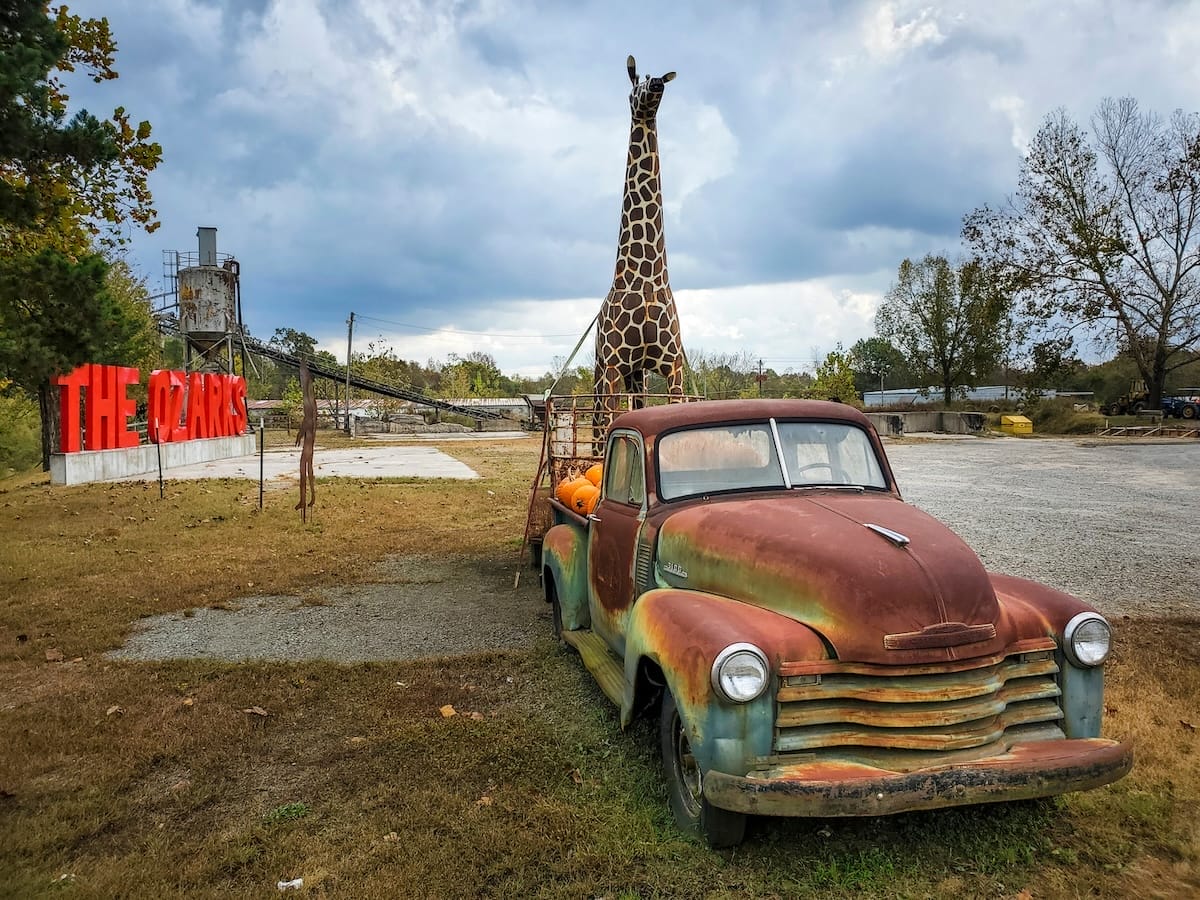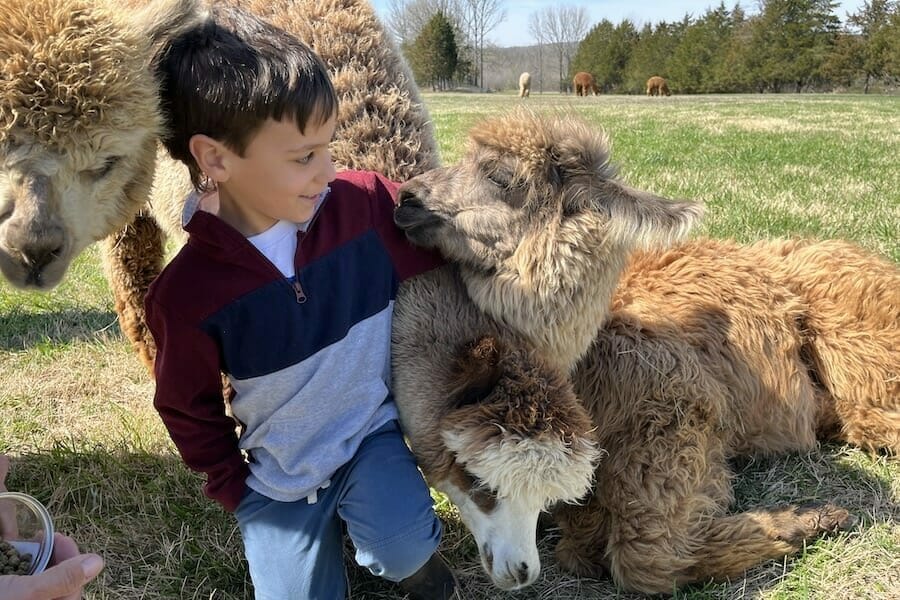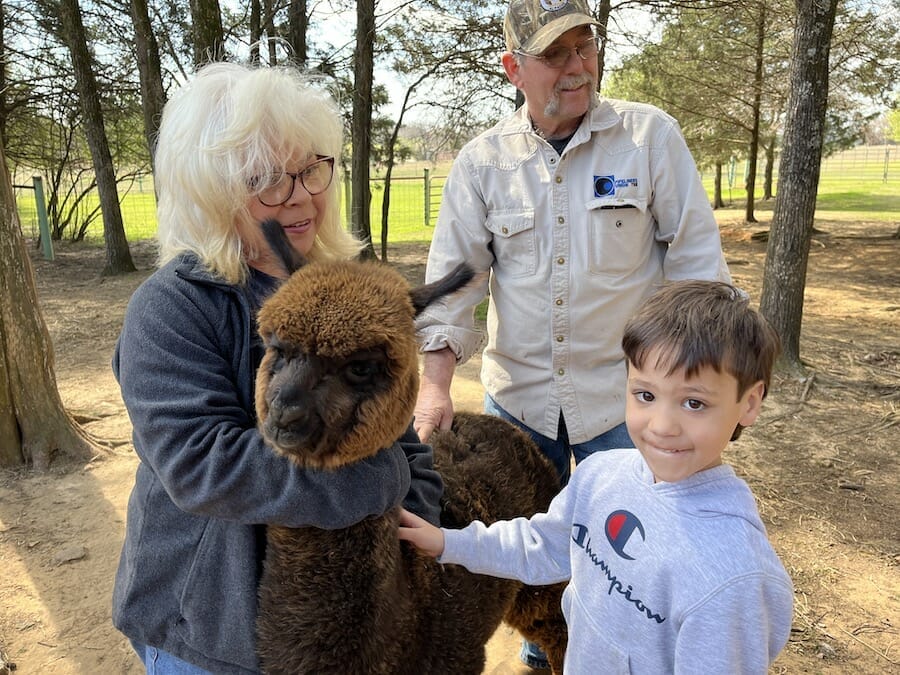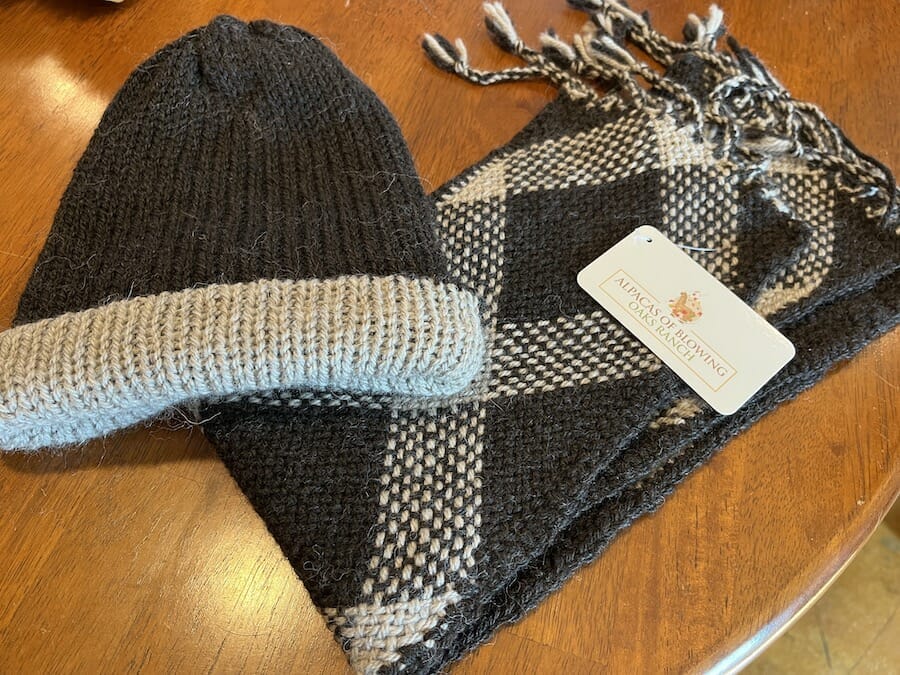

Uh oh...
It appears that you're using a severely outdated version of Safari on Windows. Many features won't work correctly, and functionality can't be guaranteed. Please try viewing this website in Edge, Mozilla, Chrome, or another modern browser. Sorry for any inconvenience this may have caused!
Read More about this safari issue.

Alpacas may be the most unusual farm animals in Arkansas. Hidden under thick layers of soft fleece, these slender animals have long necks, gangly legs and small heads with pointy ears. Often confused with its cousin the llama, alpacas are soft, cuddly, and friendly members of the camel family. Alpaca farms producing fiber and fertilizers are popping up all over the state.

What’s more fun for an animal-loving 6-year-old boy than a trip to a farm? How about an adventure to an alpaca farm? There are a handful of established alpaca farms in Arkansas and a few more just setting down roots. These curious creatures piqued my interest, so we scheduled times to visit two local farms and learn about this growing industry.
Alpacas are herd animals native to the Andes Mountains in South America. Found primarily in Peru but also Bolivia, Ecuador and Chili, these animals were treasured in the ancient Incan civilization for providing fiber, food and companionship. Their ultra-soft, cashmere-like fleece was reserved for Incan royalty and is still highly sought after today and is part of the appeal for many of Arkansas’s alpaca farmers.
Rocking H Alpacas
Our first adventure took us to rural Judsonia to visit Rodger and Anita Hastings, their 15 alpacas, a llama named Batman and a host of other animals. Anita Hastings has raised alpacas for three years for fiber and fertilizer.

A grandmother, Anita Hastings, was happy to show George around the farm and answer all of my questions. Her excitement for alpacas was contagious. I’ll admit I walked away with a bit of alpaca fever, especially after seeing the new baby alpaca that was just shy of a week old when we made our visit.
Alpacas are generally docile but can be more aggressive when the males and females are mixed. Hasting keeps her animals in separate enclosures, so everyone stays happy and safe. Many people mistakenly believe that alpacas make good guard animals, but that couldn’t be further from the truth. Alpacas have as many predators as other farm animals. Due to their docile nature and inability to defend themselves, they benefit from having a guard dog or a llama kept with them.

The Hastings love having visitors at their farm and invite you to get right into the pen with the Alpacas so you can feed them, cuddle and feel their luxurious fiber. Opening their farm to visitors allows the Hastings to educate people about Alpacas and their benefits. They have given tours to several homeschool groups, churches and local families. Hastings loves sharing her knowledge and interest with others who love animals.
As a gardener, I was excited to learn that Alpaca poo is a highly sought-after fertilizer. Unlike many animal manures that must be cured, alpaca poo is a cold fertilizer and can be added directly to your garden. Alpaca poop retains water well and adds nitrogen, potassium and phosphorus to the soil. Use the manure to make tea which can be used to water plants. Alpaca manure can even deter deer.
Blowing Oaks Ranch – Batesville
Alpacas are as gentle as they are soft, although they will not hesitate to throw their head around to get the best position at the feed bowl. Their fiber is hypoallergenic and warmer than wool. It doesn’t contain lanolin but is super soft and can wick away moisture, making it a popular fiber for hiking socks and knit caps.

At Blowing Oaks Ranch in Batesville, John and Caren Barnett have a field full of beautiful animals and a charming shop loaded with all sorts of products featuring alpacas or fashioned from their fiber. John manages the farm while Caren pours her heart and soul into weaving, knitting and crocheting scarves, hats and rugs from alpaca fiber. They also have yarn, nest balls, socks, jackets and more for sale.
Our second adventure brought us to Blowing Oaks Ranch, where the Barnetts have welcomed guests since 2021. We wandered around the field, feeding and cuddling with the alpacas, and had our hearts stolen by sweet little Cinco. Cinco was born on May 5, 2022, but a few months later injured his leg, which had to be amputated.

Following Cinco’s injury, Caren called on a co-worker at the local hospital who did work with prosthetics. Although the request was unusual, Cinco was fitted with a prosthetic leg. He recovered well, adapted quickly to life on his prosthetic and is living his best life at Blowing Oaks Ranch.
Each Alpaca farm is a little different, and you will enjoy a new experience with each one you visit. You’ll be sure to leave with knowledge and a deeper respect for these unusual creatures.
5 Facts You Didn’t Know About Alpacas
- Alpacas only have bottom teeth, so you don’t have to worry about them biting when you feed them.
- They communicate by humming, clicking and making other soft sounds. They will occasionally make a sound similar to a scream.
- Alpaca fleece is fire and water-resistant.
- Outside of zoos, alpacas have only been in the United States since 1984.
- Alpacas are environmentally friendly. Their soft two-toed hooves allow them to walk without disturbing the soil. When grazing, they only eat the top of the plant and don’t disturb the roots, and they generally use a central bathroom area rather than just going wherever they please.

Alpaca Farms Around Arkansas
These alpaca farms are working farms. Always call before heading out, as most require advance reservations for a farm visit. Be sure to check with the farmer about tour fees and requirements.
Rocking H Alpacas – Judsonia
405 Oakdale Church Rd
501-284-9700
Facebook
Blowing Oaks Ranch – Batesville
160 Harry Road
870- 291-1777
Website | Facebook
Sweet Clover Alpacas – Conway
32 Caney Creek Road
501-269-4425
Website | Facebook
Chez Fur Fiber Farm – Malvern
Alpacas, Goats, Sheep, Rabbits
15470 Highway 9
501-304-0891
Website | Facebook
Featherz Nest Alpacas – Grapevine
839 Highway 190 E
870-883-1090
Website | Facebook
We do the work.
You check your email.
Sign up for our weekly e-news.
Get stories sent straight to your inbox!











 Leave a Reply
Leave a Reply
[…] Hamilton’s Farm – Alexander Snake World – Berryville Bacchus Family Adventure Farm – Lamar Mae Farm – Fayetteville LoLo’s Backyard Barn – Waldo J-Rocks Rockin’ Ranch – Ward Barnyard Friends and Stables – Morrilton Rockin H Alpacas – Judsonia – And read more about Arkansas Alpaca Adventures! […]
[…] © Only In Arkansas […]